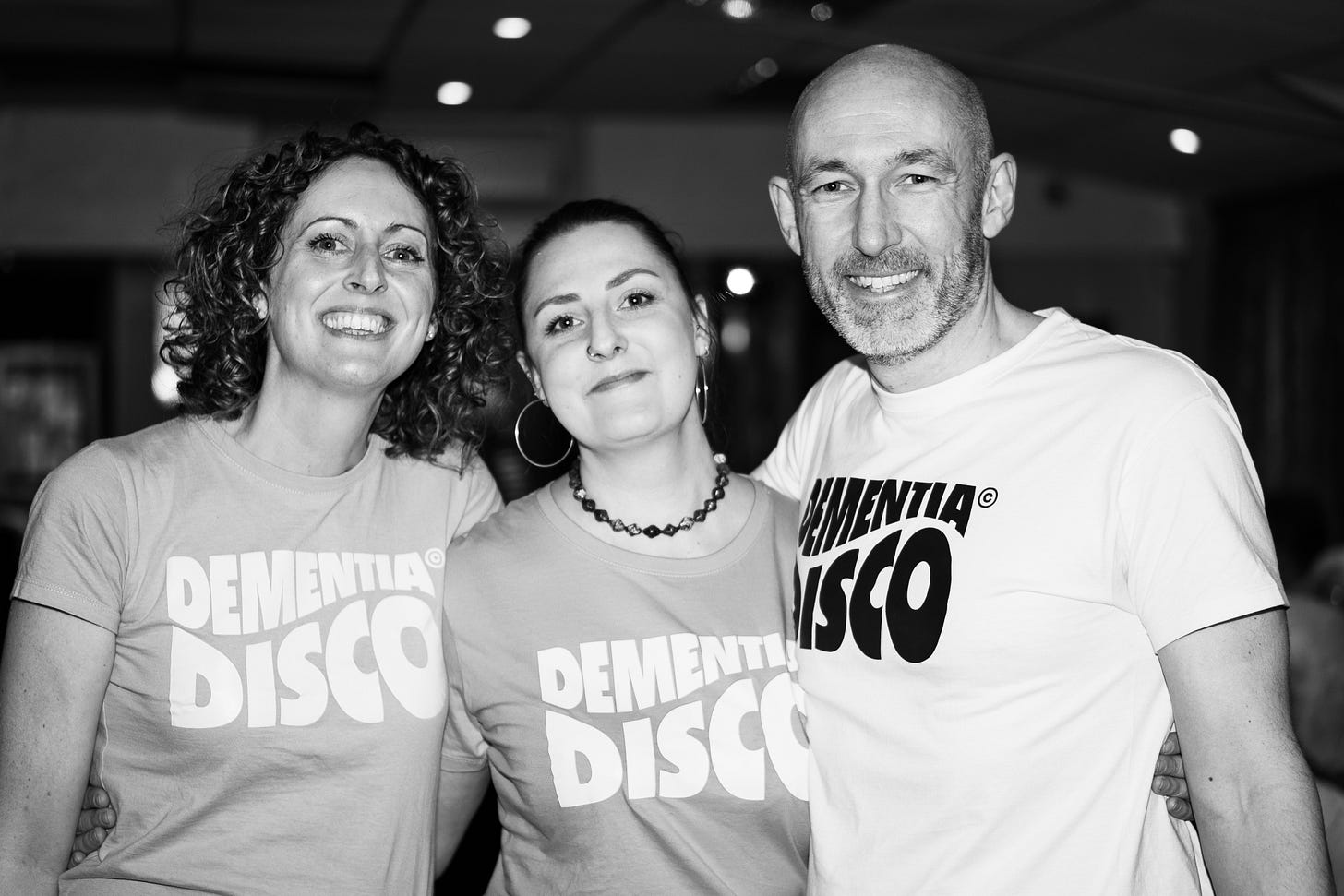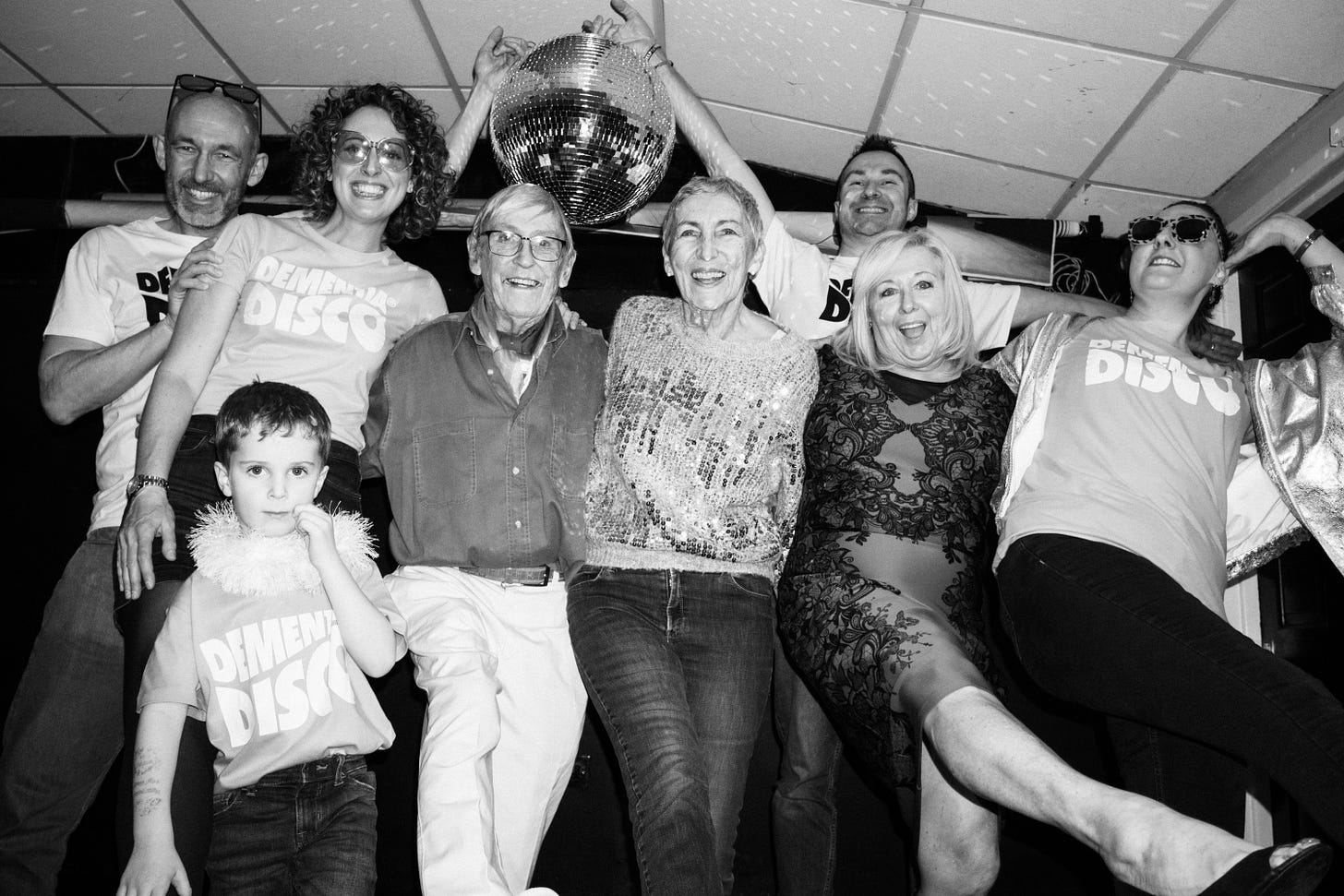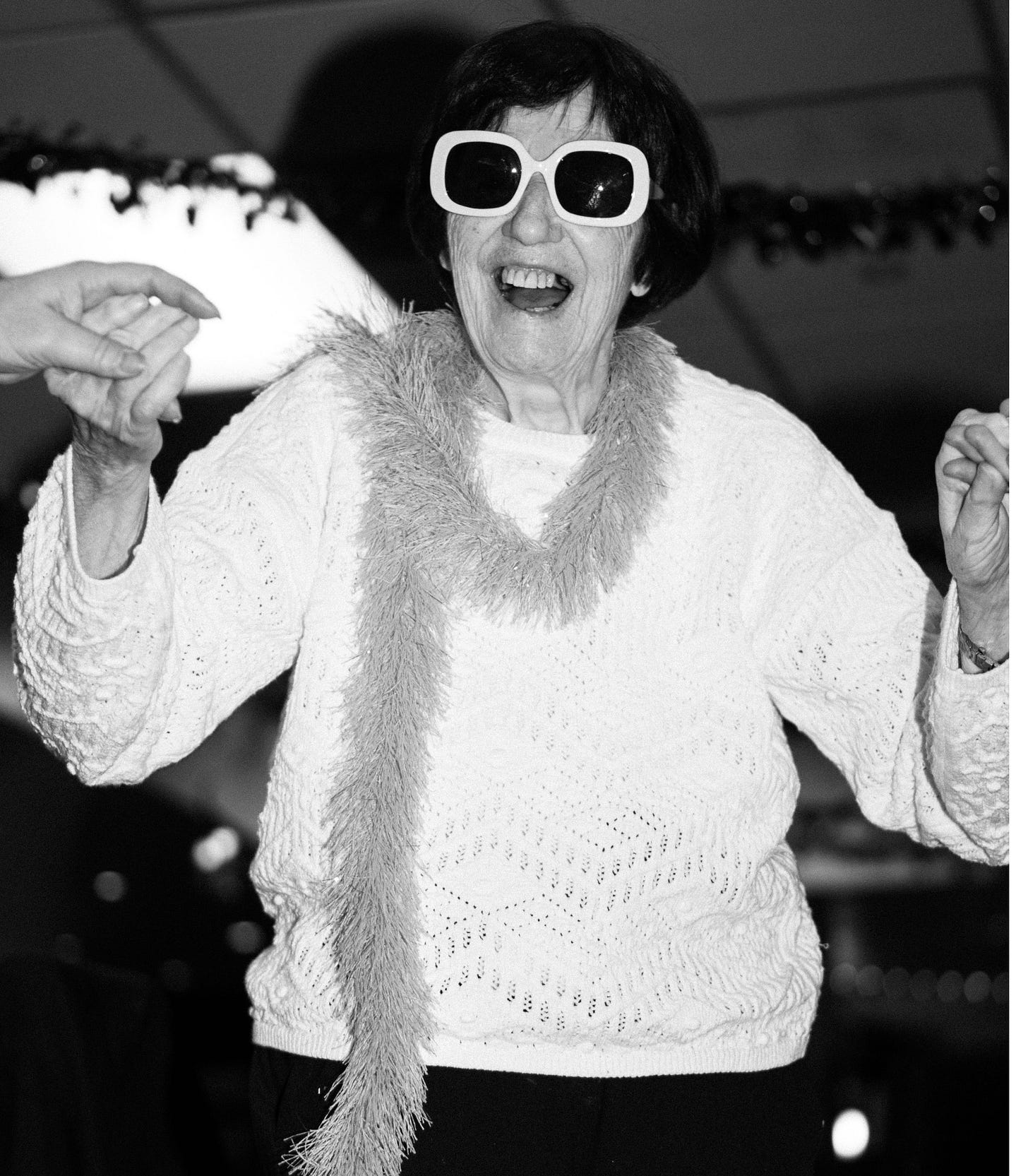The joy of dance: meet the trio behind Dementia Disco
Kate, Phil and Nick: charity founders - Stockport, UK
(Rather hear the full conversation with the Dementia Disco team? Here you go!)
“Early on, somebody joined us who was non-verbal, and their mobility wasn’t very good either. You’d wonder, ‘How do you know if they’re enjoying themselves or not?’ So, I sat down next to them and held their hand, and then they started to pulsate my hand to the rhythm of the lyrics in the song that was playing.”
You can’t miss the emotion in Phil’s voice, “They couldn’t sing it themselves, but they knew the song, and they were able to communicate that with me.”
Picking up good vibrations
Dementia Disco was established in Stockport in 2019, by brother and sister duo, Nick and Kate, and their good friend Phil. They all had a personal connection with dementia. “Our dad had Alzheimer’s and Phil’s gran had dementia,” says Nick.
At the time, Nick and Kate’s dad was only 66 years old – a lot younger than many people living with the disease. But “the dementia groups were all geared around people in their 80s – who liked sitting quietly and having a cup of tea and a biscuit in a hall.” For a man who’d grown up in the 1960s and ‘70s and had a passion for music, “somebody on a piano playing Vera Lynn songs just didn’t engage him at all”. As Nick says, “We looked around for something more interesting for him, but it didn’t exist.”
Then, by chance, Our Dementia Choir came on TV. Nick and Kate both happened to watch it and the idea of music resonated, “We both independently thought Dad would be really into that,” says Nick.
The idea quickly took hold. A few days later, he mentioned it to Phil, “And she jumped up and said, ‘That sounds so amazing!’”
Remarkably, just a few weeks later – with food donated and playlist curated – the glitter ball rotated as the doors swung open for the first Dementia Disco.
You make me feel like dancing
“We had no idea if anyone was going to turn up!” says Kate.
They needn’t have worried: 40 people came and the dance floor was packed. “Straight away the atmosphere was like a mad wedding disco!” laughs Phil. “All different generations up on the dance floor and not a malted milk biscuit in sight!”
From the start, their goal was simple: to make it free, fun and for everyone. This way, if primary carers needed a break, someone else would be more than happy to take charge for a couple of hours.
And they’d struck gold with the time: Saturdays, 5-7pm. This wasn’t planned; it was simply what worked around their full-time jobs. But, as Nick points out, “Most activities and groups are in the afternoons during the week, and there’s very little provision at all at the weekend.” Kate adds, “It’s not too late for children, so they can come. It’s not too late for people who don’t have kids yet, so they can still go out in the evening. And it’s not too late to get the person with dementia home, because bedtime can be tricky.”
Right from the start, Dementia Disco was giving people a much-needed lifeline just when they needed it: connection, laughter and joy. “That’s really important to us,” Nick says, “It’s about people going home smiling.”
Six years on, Dementia Disco is a registered charity operating across multiple locations with a bold ambition: to create a national movement that changes how people think and feel about dementia. And it’s taken a lot of hard work to get there.
I will survive
“I was in quite a difficult place before we started Dementia Disco,” Kate recalls. She’d spent 14 years going up the ranks in a telecoms company, and for a while “it was all going well”. Then the storm hit. She and her husband were going through IVF after struggling with fertility issues, her dad was diagnosed with Alzheimer’s, “And then to top it all off, our company got acquired by a telecoms giant”. “It was horrible,” she says – while she wasn’t earmarked for redundancy herself, she had the unenviable task of keeping her team motivated throughout all the upheaval and uncertainty. “I was in a really unhappy place.”
Her husband offered to shoulder their financial responsibilities so she could take a break, “Stop the job. Just take one thing off your plate.” Freed from the workplace dramas, she rebuilt her sense of self by focusing on things that really mattered: taking time to help her mum care for her dad and looking after her nephew. “It was the best thing I’ve ever done,” she recalls.
And then things started to shift. She got pregnant “Which was wonderful!”; they held the first disco; “And it’s like everything has taken off since then!”
“All those preschool years, I was able to start growing Dementia Disco,” says Kate. And in September 2024 they got funding so she could do this as her job, “And it’s really taken off!” The demand is clearly there: they now have three locations running regular discos with several more in the pipeline, “We can say we’ve become a national charity, which is incredible”.
And Dementia Disco has given her more than just a new way to make a living, “I feel a tremendous sense of purpose. Honestly, I’m happy! I feel like I’m making a difference.” She says it’s, “totally life changing”.
“I don’t know if I’ve ever said this to you before,” Nick adds, gently. “I thought doing this might just be something that gave you a bit of self-confidence and remind you how awesome you are, and then you’d go and get a job … But you’ve become CEO of a charity. It’s absolutely amazing; you’ve done an incredible thing.”
She might not have had any prior experience in the charity sector, but Kate’s corporate years turned out to be a blessing in disguise, equipping her with skills she never knew she’d need: identifying diverse income streams, forging collaborative partnerships, and securing corporate sponsorships. She’s running the charity like a small business. “Those 14 years gave me the confidence and organisational skills to do this. So, I’m very grateful for all those experiences because they’ve got me to where I am now.”
Practice what you preach
“And just so it’s not all about you, Kate. How do you feel?” Nick’s natural humour shifts the emotion as he pulls focus to Phil. “You’re a schoolteacher, it’s the weekend, you’re absolutely goosed. You don’t want to see anybody else for those whole two days, you just want to shut down…”
“Yes, I do!” agrees Phil.
“What has kept you there on your Saturday nights – and spending all day baking potatoes and stuff. Why do you do it?”
Phil works at an inner-city secondary school in the most deprived area of Manchester. “It’s an understatement that it’s not without its challenges,” she says. She teaches music and PSHE – Personal, Social, Health and Economic education – looking at things like how we treat each other, how societies work, and how communities can grow. And running Dementia Disco means her lessons aren’t just theoretical, “I get to prove to them it can be real … I literally practice what I preach.”
It’s her way of honouring her grandmother Margaret’s legacy. The two of them became very close after Margaret’s husband, Harold, died of dementia – which coincided with Phil ending a 10-year relationship. “We really bonded, going, ‘You know what, we can do this; we can have a life after something terrible has happened’.”
Sadly, a few years later, Margaret was diagnosed with vascular dementia; “The Covid pandemic meant we weren’t able to be with her when she passed away”. Her friends were her anchor, “These two here are my surrogate family.” She pauses for a moment, “I would have loved my gran to see what we’re doing”.
So, what gives her the energy to spend Saturday nights on the dance floor, after a demanding week in the classroom? It’s the feeling of wellbeing and vitality she gets from doing something that makes a difference. “For all the times I think, ‘Oh my gosh, I just want to put my feet up on the sofa tonight’ – when you’re there, for those two hours, you just have the best time. And it’s always, always worth it.”
Plus, “The jacket potatoes have always been really well received … I like getting compliments on my cooking!” A little bit of extrinsic motivation never hurt.
I can’t get no satisfaction
Nick agrees, the energy he gets from Dementia Disco powers him through, too. Currently a secondary school teacher (he was working at the same school as Phil when this all began) he also had earlier careers in law and recruitment. Although he mainly enjoyed the work, “I never got a lot of personal satisfaction out of those jobs”. So, he became a teacher because he “wanted to do something important”. He pauses, “I feel like I’ve done a lot of good, I guess.”
Phil’s quick to highlight how humble he’s being, “You’re a good teacher! I’ve seen him in the classroom: he’s great!” He bats away the compliment, “But it still never felt quite like doing this.”
Looking back on his past, he says, “I never felt like I was searching for anything. But I’ve done a lot of different things, and never really been satisfied or fulfilled. So, I think I must have been searching for something – and I think this is it!” They’re now securing funding for Nick to start working there one day a week, alongside his sister.
And the beat goes on
The team’s passion shines through. They know what they’re doing is genuinely important to a lot of people – and they have a clear vision for the future, “There should be a Dementia Disco in every town!”
They’re working tirelessly to make this happen, creating a “run your own disco” starter pack – a franchise-style model, enabling anyone in England or Wales to set up their own event. The pack shares everything they’ve learned along the way, offering step-by-step guidance and ongoing support.
And the timing is crucial as demand is growing fast, “We never want to turn someone away,” says Kate.
Get up, stand up
Every Dementia Disco needs a committed team of volunteers, “Because obviously there’s only so many I can set up and run myself!” says Kate.
There’s a role for everyone – from organising venues to curating playlists. “We’re even starting to recruit DJ volunteers,” says Nick. But they’ll need to be on their game; while many requests are songs from the 60s or 70s, “there’s some mad stuff too”. From line dancing and Johnny Cash to Chappell Roan, they’ve even had a request for house music!
But, as Nick reflects, “If you think about the age of people who were going to raves in 1990 – that’s 35 years ago. So, if they were 20 then, they’re in their mid-fifties now. And there’s plenty of people getting diagnosed with dementia in their fifties. We’re not a million miles away from having a dementia rave.” Phil laughs, “A dementia mosh pit!”
Yet, this isn’t as bonkers as it sounds. “They say the best musical years are between the ages of 10 and 30. So whatever decade of your life that period covers, they’re the kinds of songs you’ll want to hear in later life,” says Kate.
I like to move it, move it
The trio has ambitious plans for the disco’s future. They’ve just launched an annual fundraiser – a festival-style day that’s already raised an impressive £6,400 – and they organise yearly trips to the Blackpool Tower Ballroom. This year, 110 people went for afternoon tea – which was completely free of charge, as always. “I stood up on the balcony and looked out at everyone on the dance floor,” says Nick. “That was quite a powerful moment.”
They’re also thinking more widely, keen to reach people who don’t yet have a disco in their neighbourhood, by planning a smartphone app that means “everyone living with dementia can dance every day”. The concept is simple – a series of easy-to-follow moves – but the benefits significant: music positively impacts emotions and movement benefits physical and mental health, helping prevent muscle wastage so people can maintain their independence for longer.
Boogie wonderland
The impact of what they’re doing is tangible.
Kate’s seen people in care homes “remember all the words to all the songs” and even get up and dance. “I keep hearing, ‘That’s the first time she’s stood up in two weeks’.”
Nick recalls a friend whose father had become unresponsive to almost anything. Yet, “he’s always up on the dance floor”. So, not only does his friend have “the most amazing time when she comes to the disco” she’s also creating positive memories to look back on in the future.
People quickly become part of the Dementia Disco family. Johnny used to bring his wife, Hilda, until she passed away. He then started volunteering. Now he’s on the board. The community has been there for him through grief, sickness and recovery. “It’s more than a hobby,” says Phil. It’s given him purpose.
But, of course, things don’t always run quite so smoothly. While anyone with dementia must be accompanied by a carer, the team also has adult safeguarding training – which they’ve needed to use. Phil remembers one time when, “We had to quickly go from, ‘Hi everybody, it’s great to see you – let’s get your disco shoes on!’ to ‘We’re here for you in a completely different capacity. Tell us what’s going on and how can we help you’”.
This isn’t just about strutting your stuff on the dance floor, it’s a genuinely caring, supportive community. And a heavy dose of compassion is probably just what the planet needs. “I think the world is in a pretty rubbish state at the moment – and if you’ve got a diagnosis of dementia dolloped on top of that, it’s tough times, isn’t it?” says Phil. Dementia Disco offers two hours of joy and connection. “Everybody should be able to experience it.”
Don’t stop believing
If your own purpose feels painfully elusive, don’t despair. “If you’re in a job that isn’t bringing you joy, volunteering somewhere may make you realise ‘That’s what I want to do’. You might not find a career in it, but a lot of purpose starts with volunteering.” Kate’s words echo research that shows volunteering can improve your mental health and wellbeing, impacting your sense of meaning and purpose in the world.
And what if you have an idea but you’re not sure where to begin. “Just do it!” says Nick. “Just go ahead and give it a lash! I think so many people have so many good ideas and then they talk themselves out of it because they haven’t got it all planned out from beginning to end.” Don’t worry about things you don’t understand; once you start, you’ll find people who want to help. “If it means that much to you, you’ll find a way,” says Kate.
“Just take a chance” says Phil. “Something might seem really small and inconsequential at the time, but that could be the big thing you do for the rest of your life.” Nick laughs, “I certainly didn’t think mine would be going to discos with 60-year-olds!”
“Sometimes you don’t know what your purpose is going to be until you just have a go.” Phil’s gentle call to arms rings true. “If it’s meant to be, then it’s meant to be, isn’t it?”
Is it time to put on your dancing shoes, too?
If you’d like to start your own disco, donate to this incredible charity, or simply find out more, please visit the Dementia Disco website or follow them on LinkedIn, TikTok, Facebook or Instagram.
Uncut and unfiltered: the full conversation
After freezing in front of the camera with Alastair, I was going to stick to audio-only. But then, these three wonderful humans arrived in full Dementia Disco regalia, so I’m now embracing video!
Honestly, it’s worth watching – their passion and purpose really shine through.
Two things to note:
We’d chatted much longer than planned and their laptop ran out of juice, so we continued on the phone. You can just about make out what’s said, but I’ve popped the words on screen for full clarity.
If you also suffer from camera shyness and can’t turn off self-view, sticking a Post-it note on screen (covering your face) genuinely does work.




What a lovely story. They sound like a great trio. Dementia is a difficult thing for everyone involved. Well done to them for bringing some joy back to both the individuals with the condition and their families.